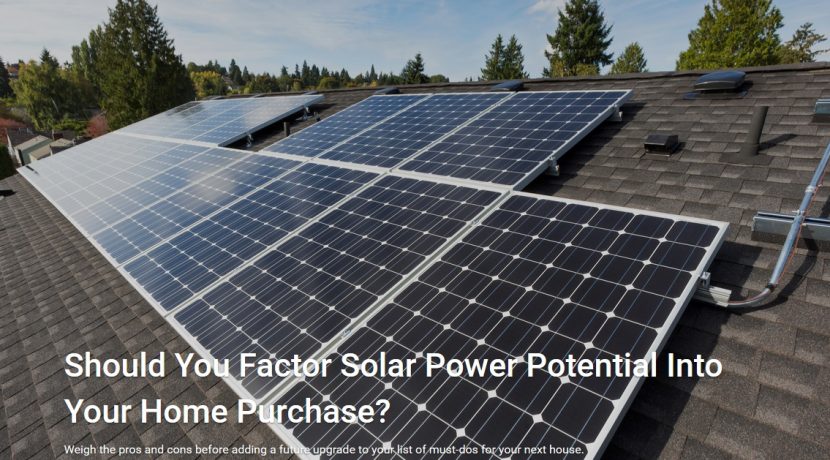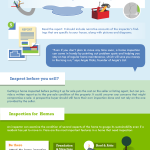Weigh the pros and cons before adding a future upgrade to your list of must-dos for your next house.
Whether you’re aiming to reduce your home’s energy usage throughout the day or you’re simply looking to see a little less of your paycheck go to utility bills, installing solar panels on your roof has likely crossed your mind. And you wouldn’t be the only one.
As of early 2016, more than 1 million homes in the U.S. had solar panels installed on their roofs, according to the Solar Energy Industries Association. It’s a small percentage of the total homes in the U.S., but a growing number nonetheless.
“For the vast majority of home shoppers … it ranks among the nice-to-have-but-not-essential things to consider,” says Aaron Terrazas, an economist for real estate information company Zillow.
A house’s potential to benefit from a solar panel system – or photovoltaic system – can even be a part of the house hunting process. In November, Zillow partnered with solar data information company Sun Number to display a home’s potential for solar power on the property’s profile – factoring in the sun exposure, regional weather patterns and roof pitch, among other things.
As the Sun Number indicates, on a scale of 1 to 100, not every home is ideal for getting a maximum benefit from solar panels. And while the score is calculated using key details of a property and its location, other factors can also make installing a PV system an unwise investment.
But if you’re a homebuyer looking to incorporate alternative energy solutions into your next house, the kind of preliminary evaluation the Sun Number provides is “definitely a place to start,” says Tim Treadwell, director of engineering, research and analysis at the Center for Sustainable Energy.
When you’re creating the checklist of must-haves for your next house with location, bedrooms and amenities that meet your family’s needs, should the property’s potential for solar power make the list?
Return on Investment
For those looking for a purely monetary gain with solar energy, data points to increased home sale prices when a PV system is installed. A December 2016 study on home PV systems and their possible impact on home values from the Lawrence Berkeley National Laboratory looked at several U.S. metro areas to determine how homes with solar panels sold compared to homes without them.
On the high end, homes with PV systems in the Florida Gulf Coast area saw a 6.39 percent higher sale price. Even generally cloudier parts of the country saw a noted increase in sale price with a PV system: The Baltimore metro area saw an average 2.52 percent higher sale price on homes with solar panel systems, and the Portland, Oregon, area saw a 3.25 percent higher premium.
The reason for a higher price? Homebuyers are aware of the potential to significantly reduce the size of their utility bill.
“That [decreased utility bill] does play into the mindset of the decision maker. And that’s why we’ve seen, over time, homes with solar get off the market sooner than homes without solar in a more apples-to-apples comparison,” says Ben Airth, senior specialist of distributed energy resources for the Center for Sustainable Energy.
Cost Comes Into Play
The cost upfront for installing solar panels on your roof is high – upwards of $30,000, depending on the size of the system, according to residential solar company Sunrun. And adding solar panels doesn’t guarantee an automatic boost in resale value on your home. Like a car, the value of the solar panels themselves decreases as soon as they’re in use.
It’s a mixture of the potential to save on utilities and decrease the household’s carbon footprint that helps lead to a higher home value in the long run. “The value degrades over time, but you’re proven to get your money back at the time of sale,” Treadwell says.
Other Priorities First
Your best course of action for considering a property’s potential for solar power is to use it as a tiebreaker when deciding between two houses that meet your other needs.
“Holding everything else constant, maybe they’ll look at something like the Sun Number and solar energy, particularly if they’re energy-conscious,” Terrazas says. “But they’ll probably prioritize the area, access to commutes – their jobs, schools – and the type of home they’re looking for.”
Once you find the right neighborhood and houses with the correct number of bedrooms, bathrooms and other amenities you need, you can weigh whether the house with more direct sunlight might be useful to you.
Research and Education Are Key
The primary reason you don’t want to put all your eggs in a solar-powered basket is because the property’s potential for a PV system isn’t guaranteed until the home is examined in-depth. Even with what appears to be a high amount of daily sunlight and a preliminary score from a measure like Sun Number, something like the way utility services are hooked up could take the cost of installation beyond what it would be worth – or what you’d be able to pay.
“If you’re buying a home and you’re interested in solar, [the Sun Number is] a really great thing to know. Now obviously, that’s necessary but not sufficient, so the next question is: How old is the roof? What’s the service going to look like?” Treadwell says.
The service refers to how you’ll benefit from the solar power, since states, counties and municipalities can deal with solar energy differently. Some have incorporated a net energy metering system, which credits the homeowner’s bill for the solar energy provided to the power company. This allows all the solar energy to be used and credited to the homeowner.
Otherwise, the homeowner could use the system so it only benefits her house’s utility usage, though that means some of the solar energy created during the daylight hours would go to waste since most people are at work. At night when there’s no sun, the household would switch back to traditional energy sources.
You should also fully understand your local solar panel system ownership options. In some places, the panel system is considered to be leased from the county by the homeowner in exchange for the reduced utility bill. In others, the system is fully owned by the homeowner or can be financed by a lender – but that loan is tied to the real estate and can become a lien on the property.
In the end, though, it’s up to you as the homeowner to determine if solar panels are the best next step for your property. As the cost of real estate and utilities continue to rise – not to mention discussions of humans’ impact on the environment – Terrazas, Treadwell and Airth expect solar energy in the home to increase in popularity.
“If they can save $400 on their utility bill, certainly that’s going to be something they’re going to take into account,” Terrazas says. ~Devon Thorsby







